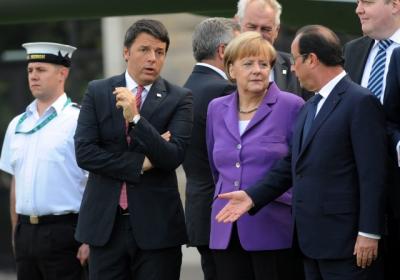Italy one of the three at Europe’s high table

ROME – The Italian Prime Minister, Matteo Renzi, was joining Angela Merkel and Francois Hollande, in Berlin on Monday evening to discuss how to proceed following the Brexit vote - Renzi claims he is an arbitrator between the caution of Merkel and the haste of Hollande, a political official reports.
With Britain now out of the equation, the four major powers within Europe have now been reduced to three and Renzi is viewing it as a considerable boost to the country’s relative importance in the bloc. Though whether this is a genuine “promotion” remains to be seen.
Renzi appears to be maximising on this shift in power to secure his own reputation, which has recently taken a bit of a battering in the Italian mayoral elections, Il Messaggero suggests. In an interview with Tgl, Renzi said that “Italy is first in line to change Europe”, giving sceptics the opinion that his counter to his sinking status among his own people, is to become a vital figure within the EU.
Personal politics, despite best efforts of concealment, appears to be having an influence on the suggested plans of the French and German leaders. Francois Hollande, President of France has called for Britain to make “a rapid divorce from the EU”, a rather brutal judgement that implies fear of a Le Pen’s break-away party move gaining strength in France prior to 2017 elections. Angela Merkel, the German Chancellor, has however, rather than demanding the instantaneous ejection of the British from the Union, has taken a more cautious line, which has more respect of the markets. This move, which has been described by the German paper, Die Welt, as “playing for time”, is a hint towards the large Eurosceptic contingent within Merkel’s own party, the Christian-Democrats, whose votes the Chancellor is not willing to jeopardise given the imminence of the elections next year.
Renzi who, rather cunningly has chosen the safe spot in the middle, is aiming to play the mediator between France and Germany’s rather opposing views on Europe’s next steps. He interprets the exit of Britain from the Union as something positive for Italy, saying that “the fact that they have called Italy into the control room means that the country has returned to being viewed as stable and trustworthy.” His decision to stick more in line with the German position of progressing with meditated caution, has led to conjecture that for the next couple of years at least, it will be these two countries that hold the cards of Europe in their hand.
dt


